Miscellaneous papers relating to Malcolm William Keshan - Part 3 of 3
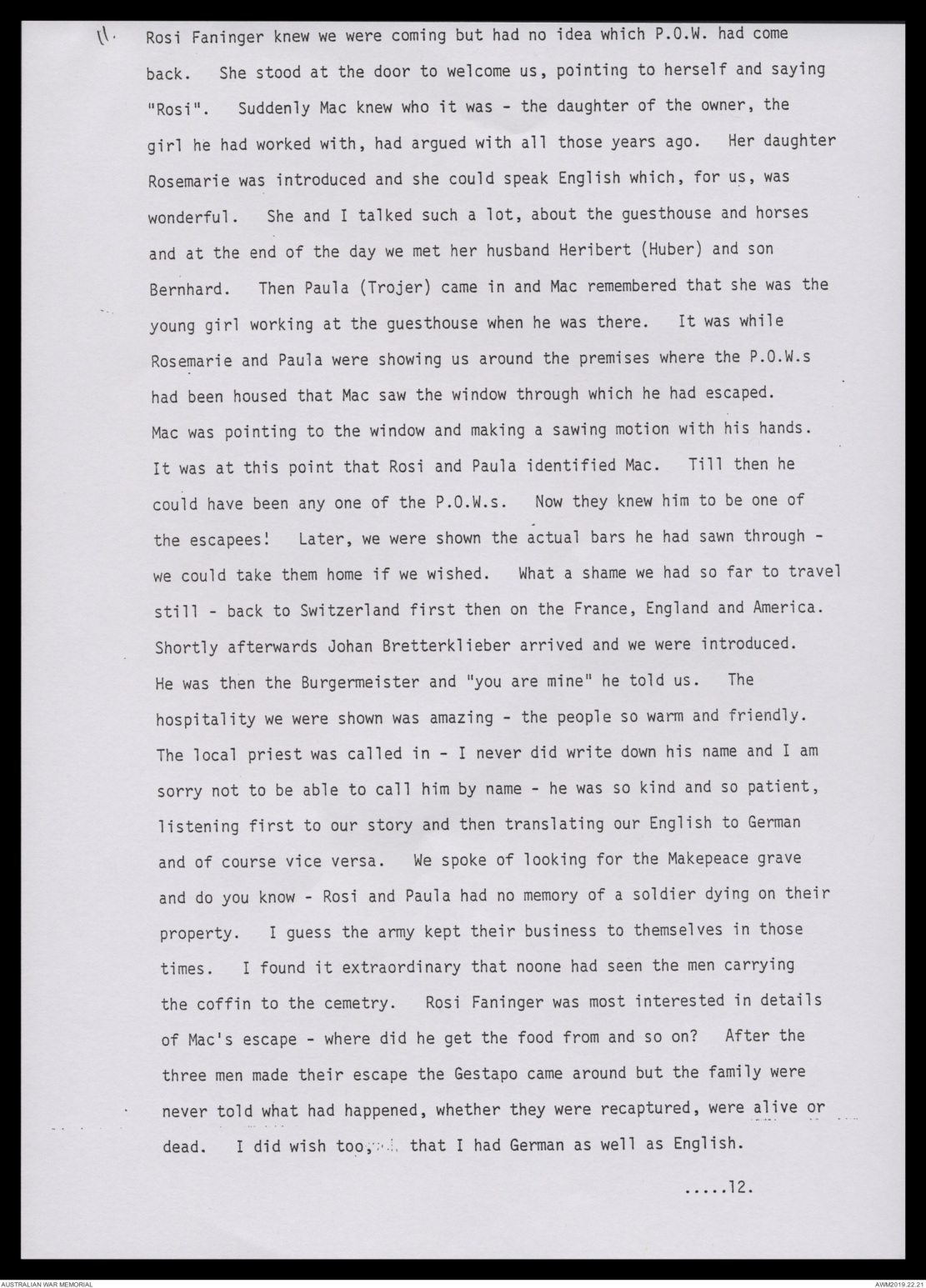
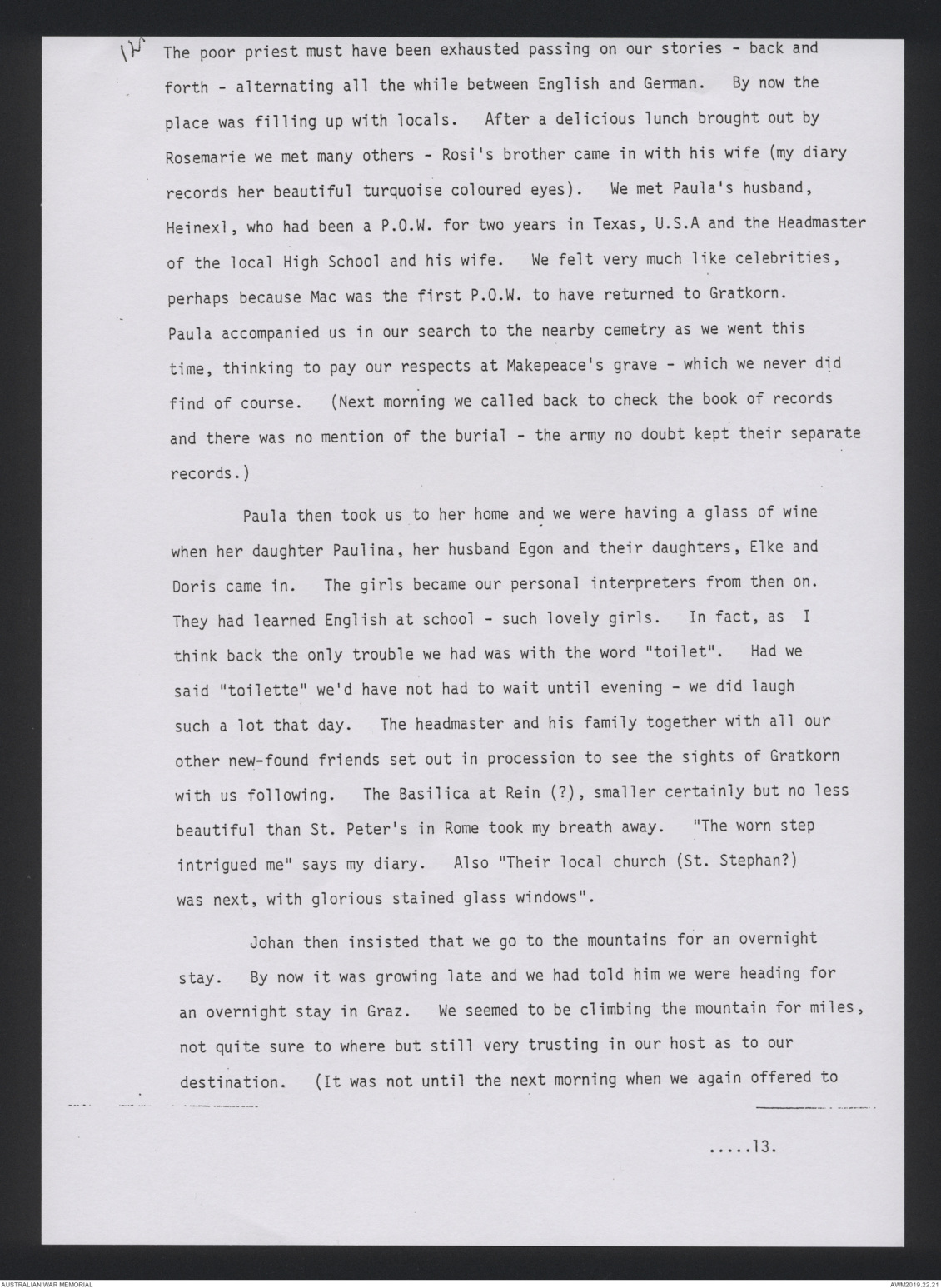
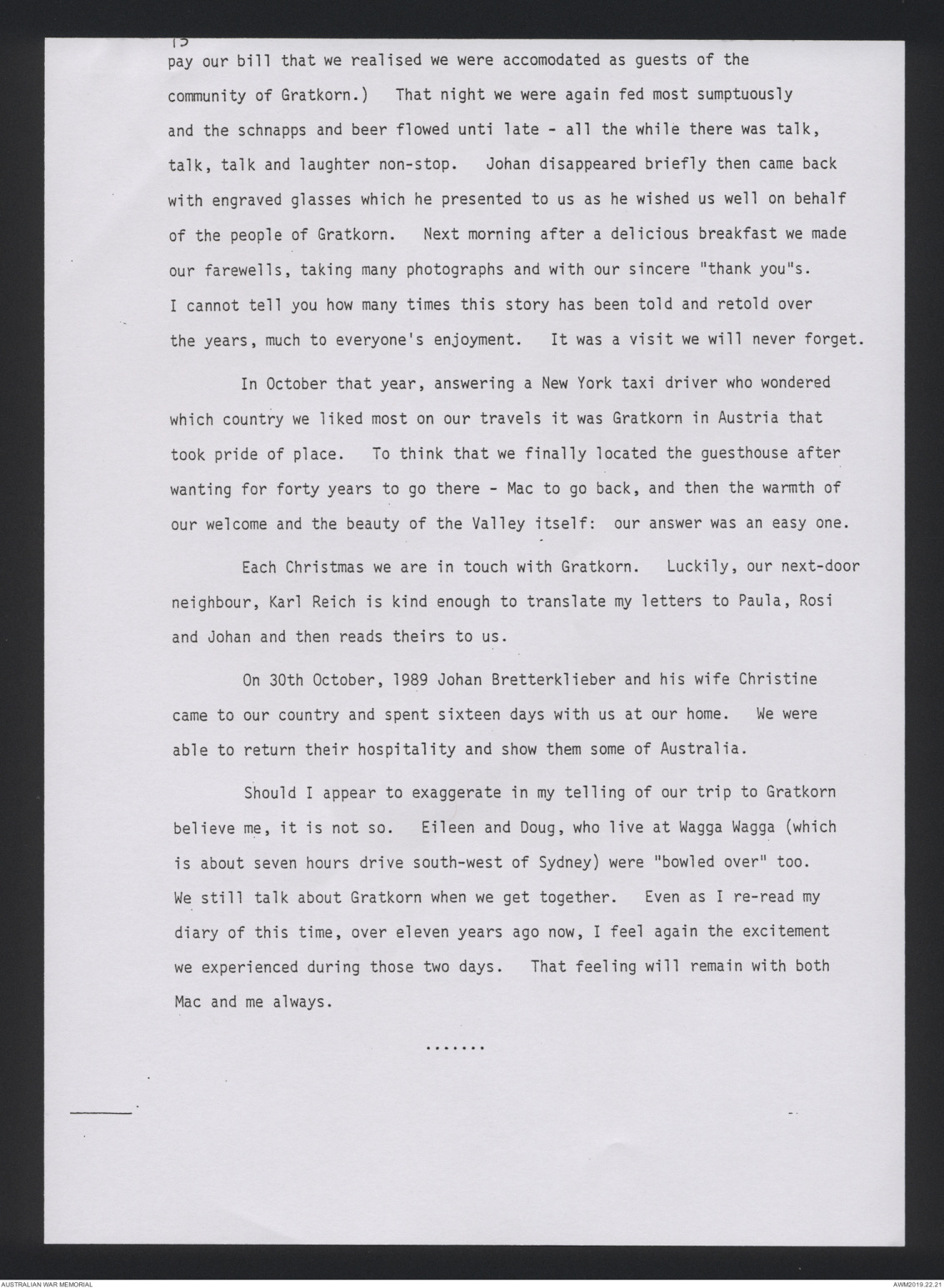
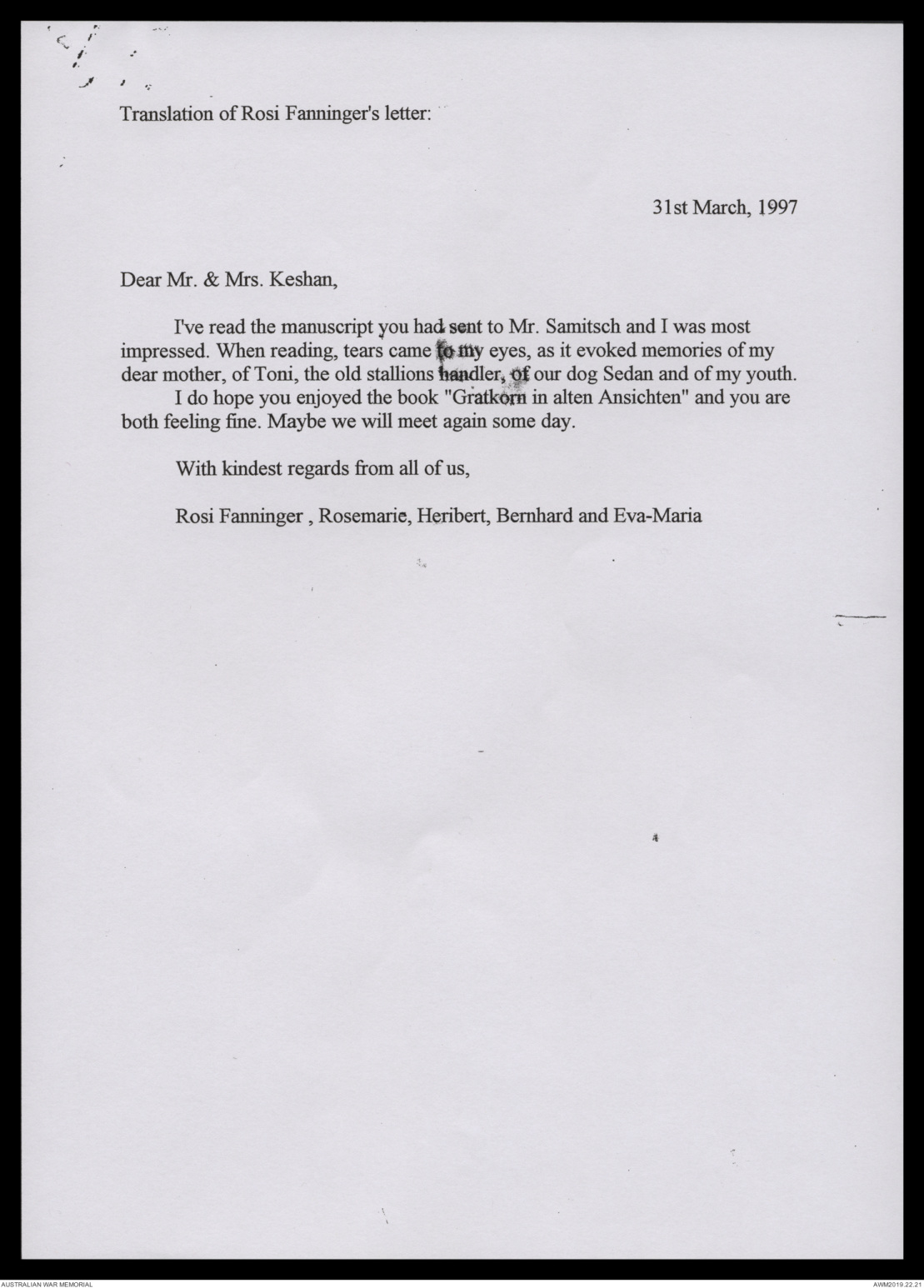
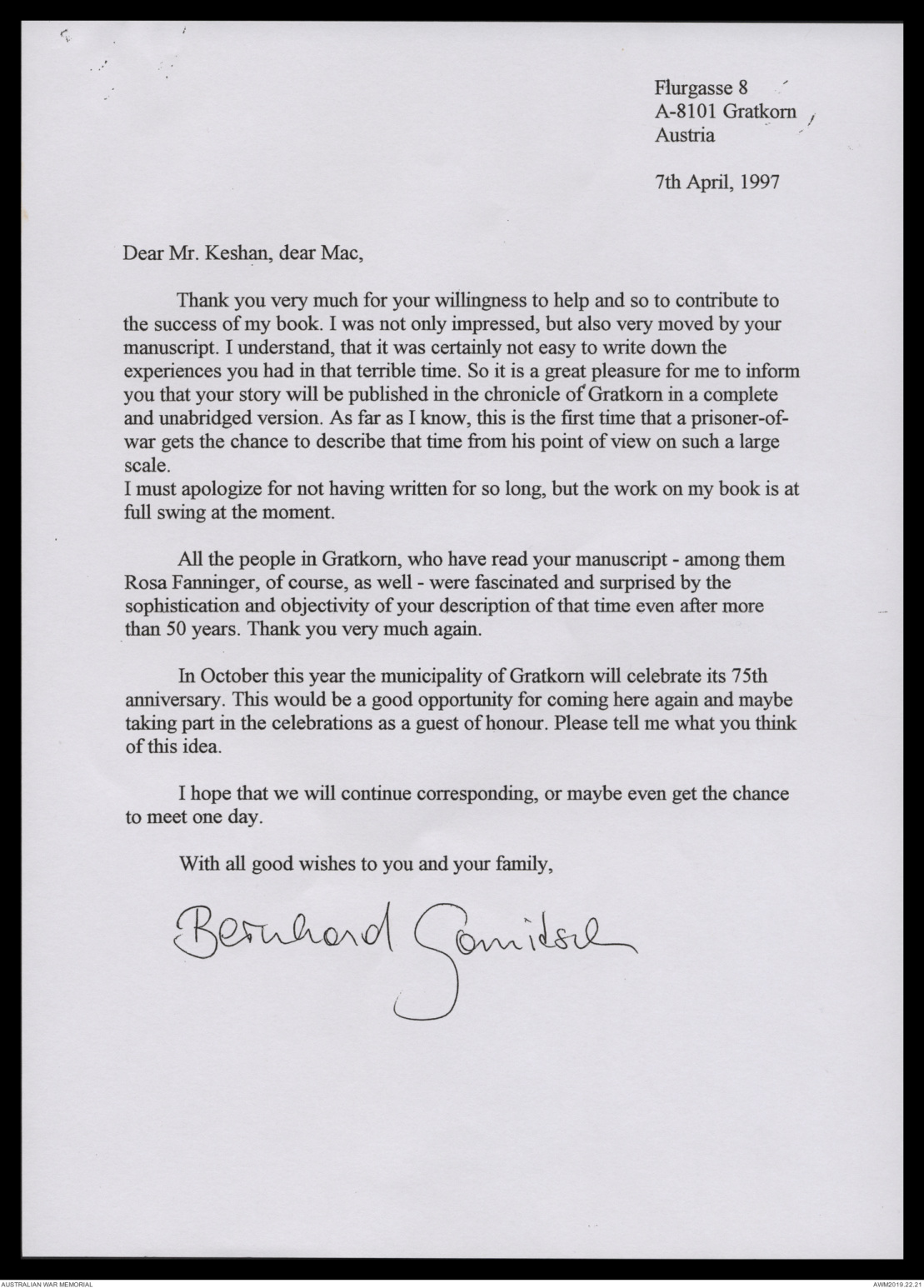
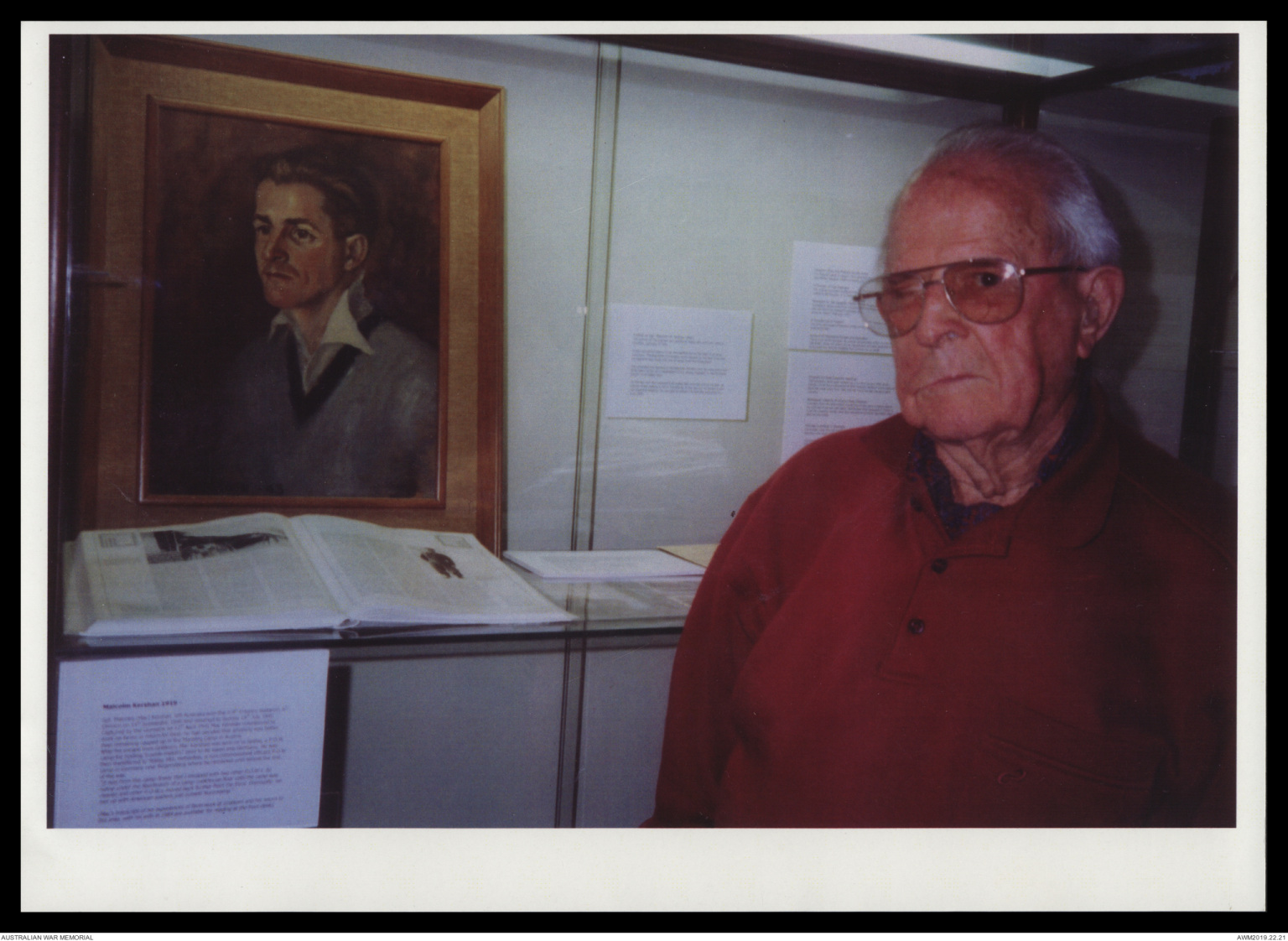
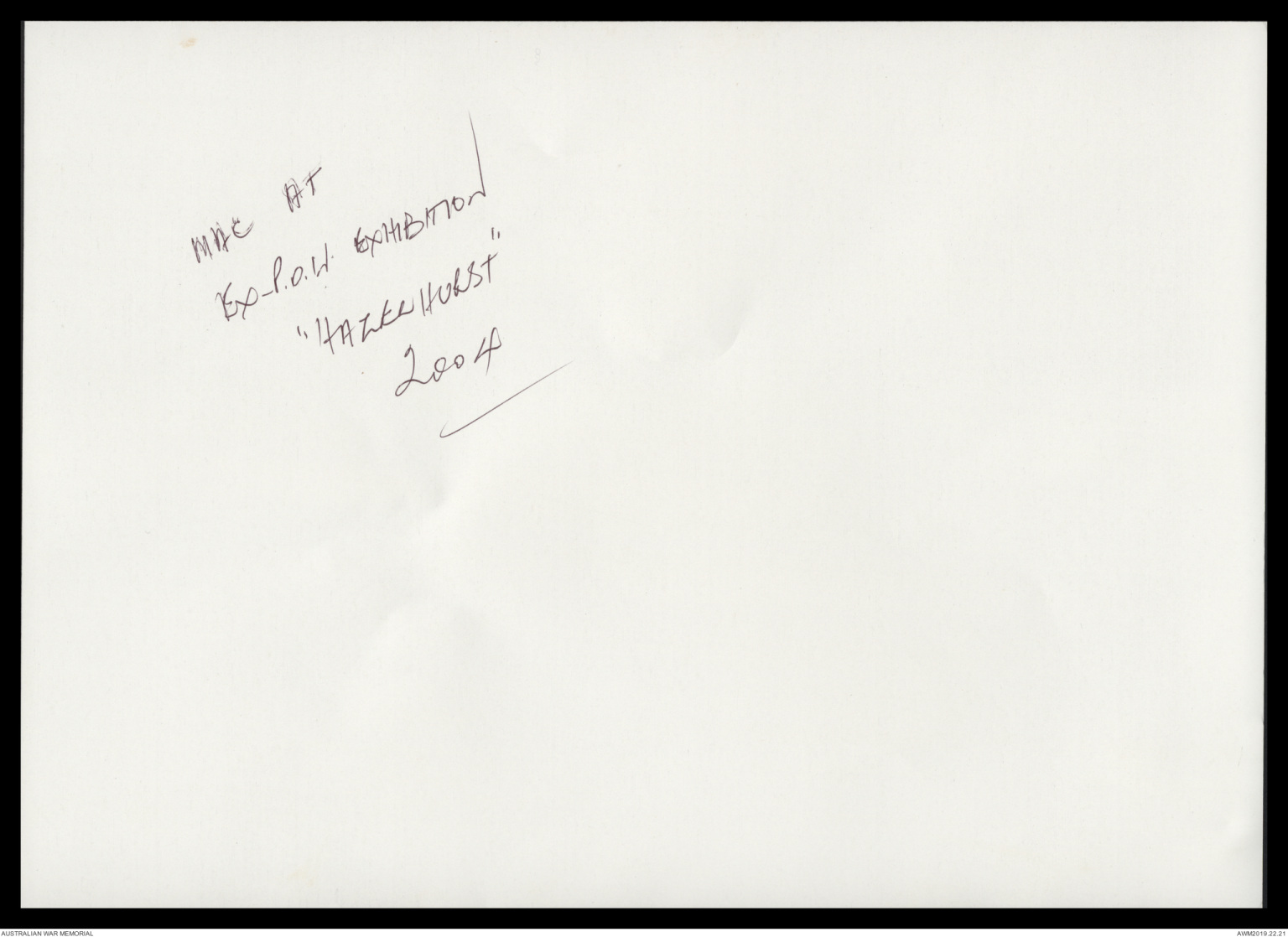
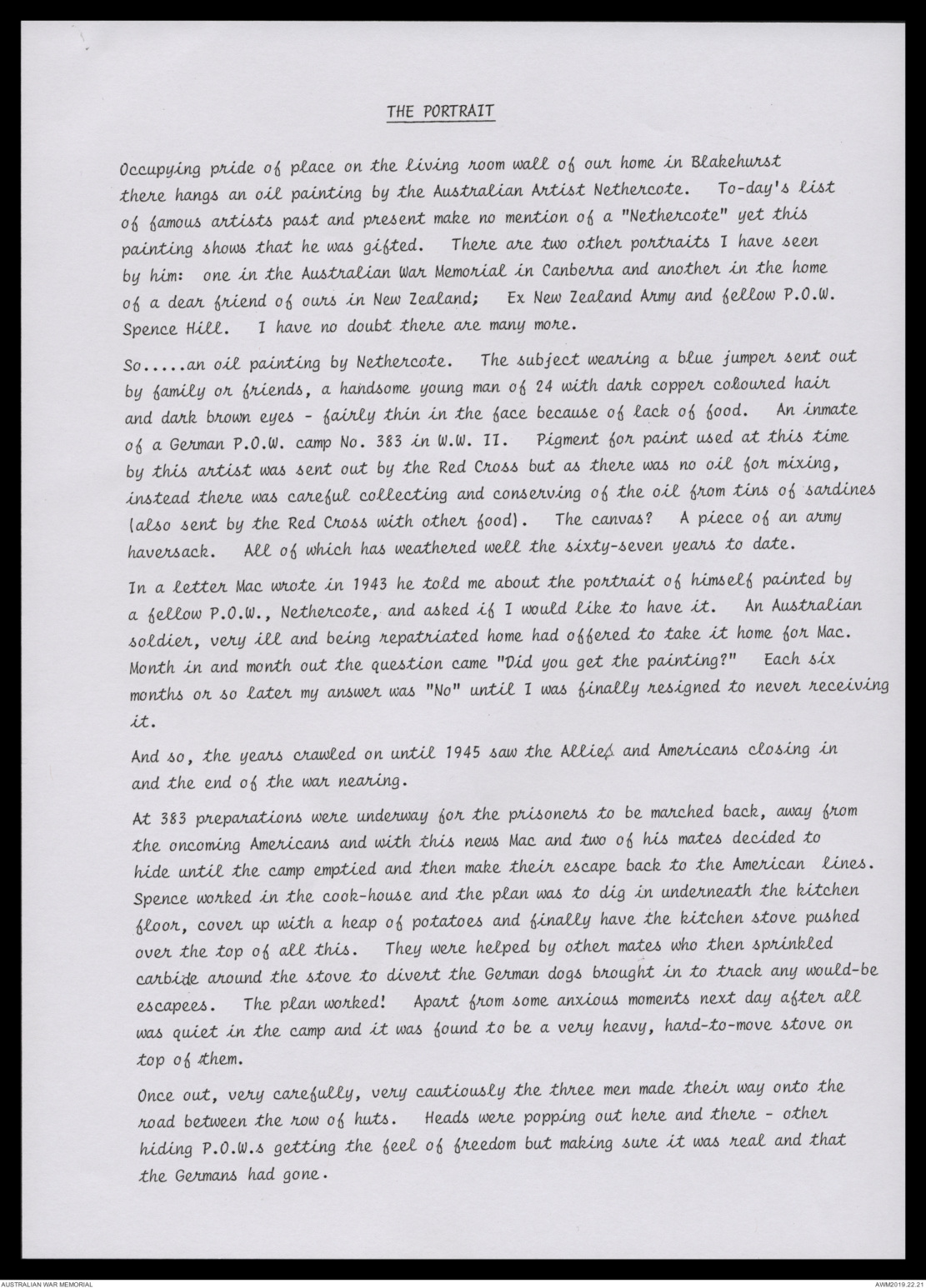
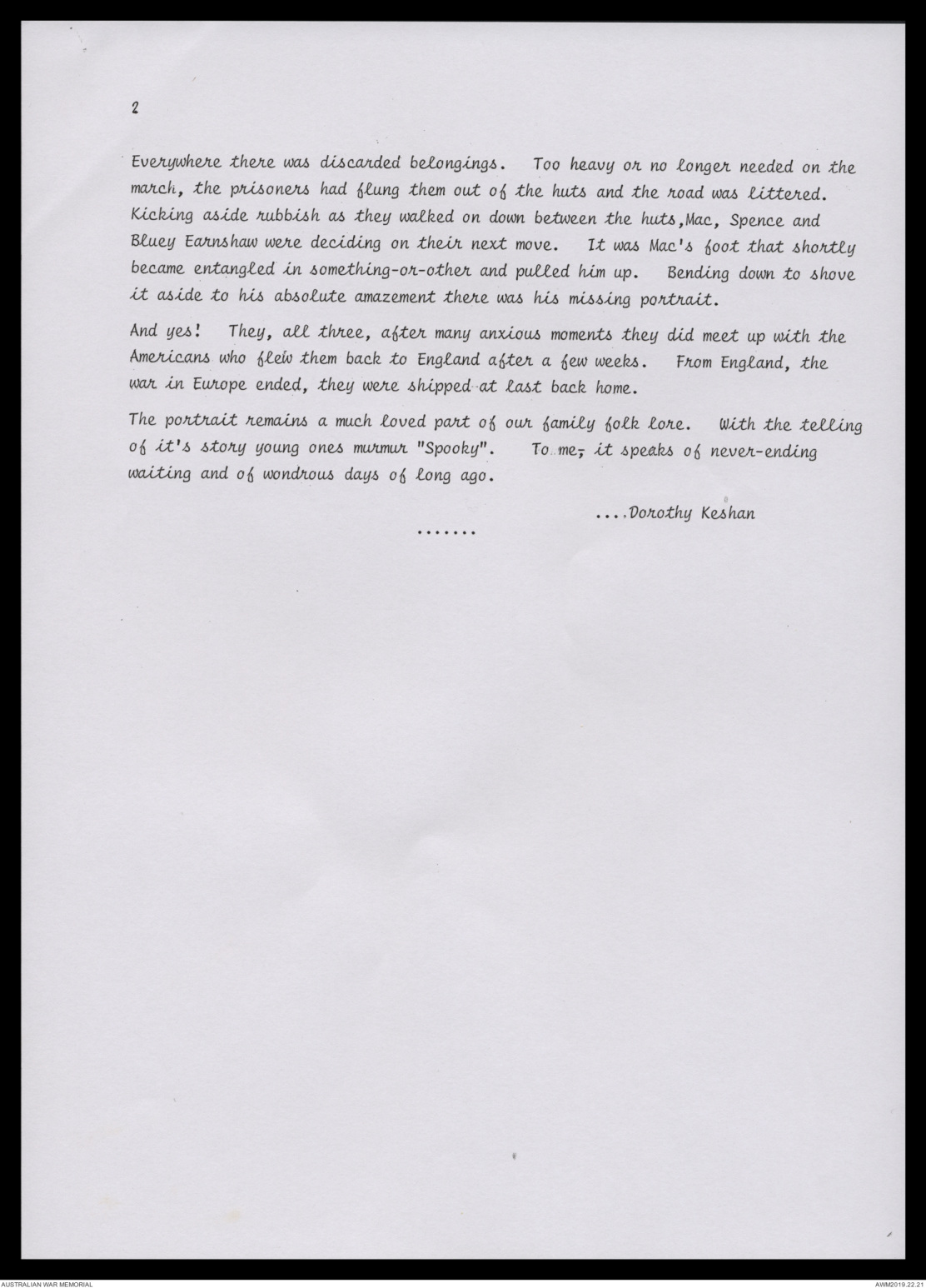
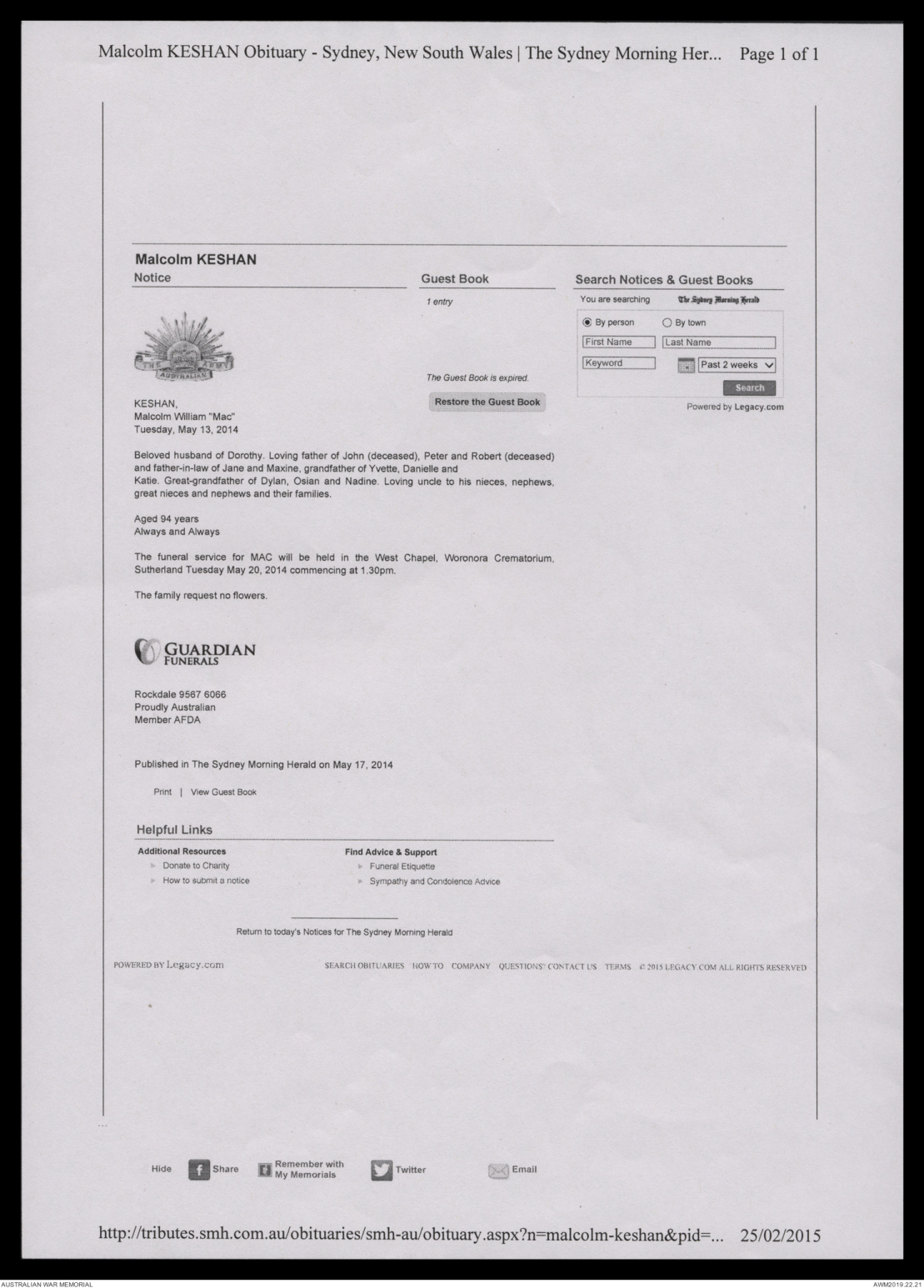
11.
Rosi Faninger knew we were coming but had no idea which P.O.W. had come
back. She stood at the door to welcome us, pointing to herself and saying
"Rosi". Suddenly Mac knew who it was - the daughter of the owner, the
girl he had worked with, had argued with all those years ago. Her daughter
Rosemarie was introduced and she could speak English which, for us, was
wonderful. She and I talked such a lot, about the guesthouse and horses
and at the end of the day we met her husband Heribert (Huber) and son
Bernhard. Then Paula (Trojer) came in and Mac remembered that she was the
young girl working at the guesthouse when he was there. It was while
Rosemarie and Paula were showing us around the premises where the P.O.W.s
had been housed that Mac saw the window through which he had escaped.
Mac was pointing to the window and making a sawing motion with his hands.
It was at this point that Rosi and Paula identified Mac. Till then he
could have been any one of the P.O.W.s. Now they knew him to be one of
the escapees! Later, we were shown the actual bars he had sawn through-
we could take them home if we wished. What a shame we had so far to travel
still - back to Switzerland first then on the France, England and America.
Shortly afterwards Johan Bretterklieber arrived and we were introduced.
He was then the Burgermeister and "you are mine" he told us. The
hospitality we were shown was amazing - the people so warm and friendly.
The local priest was called in - I never did write down his name and I am
sorry not to be able to call him by name - he was so kind and so patient,
listening first to our story and then translating our English to German
and of course vice versa. We spoke of looking for the Makepeace grave
and do you know - Rosi and Paula had no memory of a soldier dying on their
property. I guess the army kept their business to themselves in those
times. I found it extraordinary that noone had seen the men carrying
the coffin to the cemetry. Rosi Faninger was most interested in details
of Mac's escape - where did he get the food from and so on? After the
three men made their escape the Gestapo came around but the family were
never told what had happened, whether they were recaptured, were alive or
dead. I did wish too, that I had German as well as English.
.....12.
12.
The poor priest must have been exhausted passing on our stories - back and
forth - alternating all the while between English and German. By now the
place was filling up with locals. After a delicious lunch brought out by
Rosemarie we met many others - Rosi's brother came in with his wife (my diary
records her beautiful turquoise coloured eyes). We met Paula's husband,
Heinexl, who had been a P.O.W. for two years in Texas, U.S.A and the Headmaster
of the local High School and his wife. We felt very much like celebrities,
perhaps because Mac was the first P.O.W. to have returned to Gratkorn.
Paula accompanied us in our search to the nearby cemetry as we went this
time, thinking to pay our respects at Makepeace's grave - which we never did
find of course. (Next morning we called back to check the book of records
and there was no mention of the burial - the army no doubt kept their separate
records.)
Paula then took us to her home and we were having a glass of wine
when her daughter Paulina, her husband Egon and their daughters, Elke and
Doris came in. The girls became our personal interpreters from then on.
They had learned English at school - such lovely girls. In fact, as I
think back the only trouble we had was with the word "toilet". Had we
said "toilette" we'd have not had to wait until evening - we did laugh
such a lot that day. The headmaster and his family together with all our
other new-found friends set out in procession to see the sights of Gratkorn
with us following. The Basilica at Rein (?), smaller certainly but no less
beautiful than St. Peter's in Rome took my breath away. "The worn step
intrigued me" says my diary. Also "Their local church (St. Stephan?)
was next, with glorious stained glass windows".
Johan then insisted that we go to the mountains for an overnight
stay. By now it was growing late and we had told him we were heading for
an overnight stay in Graz. We seemed to be climbing the mountain for miles,
not quite sure to where but still very trusting in our host as to our
destination. (It was not until the next morning when we again offered to
.....13.
13
pay our bill that we realised we were accomodated as guests of the
community of Gratkorn.) That night we were again fed most sumptuously
and the schnapps and beer flowed unti late - all the while there was talk,
talk, talk and laughter non-stop. Johan disappeared briefly then came back
with engraved glasses which he presented to us as he wished us well on behalf
of the people of Gratkorn. Next morning after a delicious breakfast we made
our farewells, taking many photographs and with our sincere "thank you"s.
I cannot tell you how many times this story has been told and retold over
the years, much to everyone's enjoyment. It was a visit we will never forget.
In October that year, answering a New York taxi driver who wondered
which country we liked most on our travels it was Gratkorn in Austria that
took pride of place. To think that we finally located the guesthouse after
wanting for forty years to go there - Mac to go back, and then the warmth of
our welcome and the beauty of the Valley itself: our answer was an easy one.
Each Christmas we are in touch with Gratkorn. Luckily, our next-door
neighbour, Karl Reich is kind enough to translate my letters to Paula, Rosi
and Johan and then reads theirs to us.
On 30th October, 1989 Johan Bretterklieber and his wife Christine
came to our country and spent sixteen days with us at our home. We were
able to return their hospitality and show them some of Australia.
Should I appear to exaggerate in my telling of our trip to Gratkorn
believe me, it is not so. Eileen and Doug, who live at Wagga Wagga (which
is about seven hours drive south-west of Sydney) were "bowled over" too.
We still talk about Gratkorn when we get together. Even as I re-read my
diary of this time, over eleven years ago now, I feel again the excitement
we experienced during those two days. That feeling will remain with both
Mac and me always.
.......
Translation of Rosi Fanninger’s letter:
31st March, 1997
Dear Mr. & Mrs. Keshan,
I've read the manuscript you had sent to Mr. Samitsch and I was most
impressed. When reading, tears came to my eyes, as it evoked memories of my
dear mother, of Toni, the old stallions handler, of our dog Sedan and of my youth.
I do hope you enjoyed the book "Gratkorn in alten Ansichten” and you are
both feeling fine. Maybe we will meet again some day.
With kindest regards from all of us,
Rosi Fanninger , Rosemarie, Heribert, Bernhard and Eva-Maria
Flurgasse 8
A-8101 Gratkorn
Austria
7th April, 1997
Dear Mr. Keshan, dear Mac,
Thank you very much for your willingness to help and so to contribute to
the success of my book. I was not only impressed, but also very moved by your
manuscript. I understand, that it was certainly not easy to write down the
experiences you had in that terrible time. So it is a great pleasure for me to inform
you that your story will be published in the chronicle of Gratkorn in a complete
and unabridged version. As far as I know, this is the first time that a prisoner-of¬
war gets the chance to describe that time from his point of view on such a large
scale.
I must apologize for not having written for so long, but the work on my book is at
full swing at the moment.
All the people in Gratkorn, who have read your manuscript - among them
Rosa Fanninger, of course, as well - were fascinated and surprised by the
sophistication and objectivity of your description of that time even after more
than 50 years. Thank you very much again.
In October this year the municipality of Gratkorn will celebrate its 75th
anniversary. This would be a good opportunity for coming here again and maybe
taking part in the celebrations as a guest of honour. Please tell me what you think
of this idea.
I hope that we will continue corresponding, or maybe even get the chance
to meet one day.
With all good wishes to you and your family,
Bernhard Somidsil
MAC AT
EX-P.O.W. EXHIBITION
“HAZELHURST”
2004
THE PORTRAIT
Occupying pride of place on the living room wall of our home in Blakehurst
there hangs an oil painting by the Australian Artist Nethercote. To-day's list
of famous artists past and present make no mention of a "Nethercote" yet this
painting shows that he was gifted. There are two other portraits I have seen
by him: one in the Australian War Memorial in Canberra and another in the home
of a dear friend of ours in New Zealand; Ex New Zealand Army and fellow P.O.W.
Spence Hill. I have no doubt there are many more.
So.....an oil painting by Nethercote. The subject wearing a blue jumper sent out
by family or friends, a handsome young man of 24 with dark copper coloured hair
and dark brown eyes - fairly thin in the face because of lack of food. An inmate
of a German P.O.W. camp No. 383 in W.W. 11. Pigment for paint used at this time
by this artist was sent out by the Red Cross but as there was no oil for mixing,
instead there was careful collecting and conserving of the oil from tins of sardines
(also sent by the Red Cross with other food). The canvas? A piece of an army
haversack. All of which has weathered well the sixty-seven years to date.
In a letter Mac wrote in 1943 he told me about the portrait of himself painted by
a fellow P.O.W., Nethercote, and asked if I would like to have it. An Australian
soldier, very ill and being repatriated home had offered to take it home for Mac.
Month in and month out the question came "Did you get the painting?" Each six
months or so later my answer was "No" until I was finally resigned to never receiving
it.
And so, the years crawled on until 1945 saw the Allies and Americans closing in
and the end of the war nearing.
At 383 preparations were underway for the prisoners to be marched back, away from
the oncoming Americans and with this news Mac and two of his mates decided to
hide until the camp emptied and then make their escape back to the American lines.
Spence worked in the cook-house and the plan was to dig in underneath the kitchen
floor, cover up with a heap of potatoes and finally have the kitchen stove pushed
over the top of all this. They were helped by other mates who then sprinkled
carbide around the stove to divert the German dogs bought in to track any would-be
escapees. The plan worked! Apart from some anxious moments next day after all
was quiet in the camp and it was found to be a very heavy, hard-to-move stove on
top of them.
Once out, very carefully, very cautiously the three men made their way onto the
road between the row of huts. Heads were popping out here and there - other
hiding P.O.W.s getting the feel of freedom but making sure it was real and that
the Germans had gone.
Everywhere there was discarded belongings. Too heavy or no longer needed on the
march, the prisoners had flung them out of the huts and the road was littered.
Kicking aside rubbish as they walked on down between the huts, Mac, Spence and
Bluey Earnshaw were deciding on their next move. It was Mac's foot that shortly
became entangled in something-or-other and pulled him up. Bending down to shove
it aside to his absolute amazement there was his missing portrait.
And yes! They, all three, after many anxious moments they did meet up with the
Americans who flew them back to England after a few weeks. From England, the
war in Europe ended, they were shipped at last back home.
The portrait remains a much loved part of our family folk lore. With the telling
of it’s story young ones murmur "Spooky". To me; it speaks of never-ending
waiting and of wondrous days of long ago.
....Dorothy Keshan
.......
Malcolm KESHAN Obituary - Sydney, New South Wales The Sydney Morning Her... Page 1 of 1
Malcolm KESHAN
Notice Guest Book Search Notices & Guest Books
1 entry You are searching. The Sydney Morning Herald
By person By town
First Name Last Name
Keyword Past 2 weeks
The Guest Book is expired
Search
Restore the Guest Book
Powered by Legacy.com
KESHAN.
Malcolm William “Mac”
Tuesday, May 13, 2014
Beloved husband of Dorothy. Loving father of John (deceased). Peter and Robert (deceased)
and father-in-law of Jane and Maxine, grandfather of Yvette, Danielle and
Katie. Great-grandfather of Dylan, Osian and Nadine. Loving uncle to his nieces, nephews,.
great nieces and nephews and their families.
Aged 94 years
Always and Always
The funeral service for MAC wil be held in the West Chapel, Woronora Crematorium.
Sutherland Tuesday May 20, 2014 commencing at 1.30pm.
The family request no flowers.
GUARDIAN
FUNERALS
Rockdale 9567 6066
Proudly Australian
Member AFDA
Published in The Sydney Morning Herald on May 17. 2014
Print | View Guest Book
Helpful Links
Additional Resources Find Advice & Support
Donate to Charity Funeral Etiquette
How to submit a notice Sympathy and Condolences Advice
Return to today’s Notice for The Sydney Morning Herald
POWERED BY Legacy.com SEARCH OBITUARIES HOW TO COMPANY QUESTIONS CONTACT US TERMS C 2015 LEGACY.COM ALL RIGHTS RESERVED
Hide F Share Remember with My Memorials Twitter Email
http://tributes.smh.com.au/obituaries/smh-au/obituary.aspx?nmalcolm-kesha&pid=… 25/02/2015
 Jacqueline Kennedy
Jacqueline KennedyThis transcription item is now locked to you for editing. To release the lock either Save your changes or Cancel.
This lock will be automatically released after 60 minutes of inactivity.